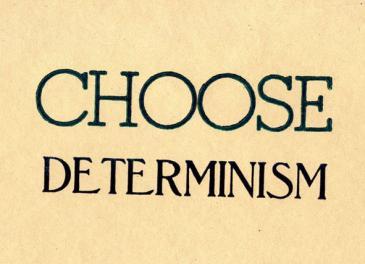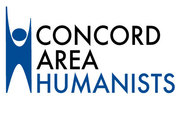Posted on March 10, 2014 by David

A few nights ago, those of us at Concord Area Humanists had a speaker, Tom Clark, discuss free will and determinism (among other topics of Naturalism). I’m not going to say that I followed everything he said, but I wanted to present my theoretical model that I have created which allows me to accept both free will and determinism without any distortions to my worldview.
The problem with free will and determinism occurs when we feel that our behavior is strictly the result of our will – or our desire. The problem comes up when we experience behavior that seems contrary to our desires. There seem to be other causes, or contra-causes acting within our psyche that determines our behavior in addition to our wants and desires. Sometimes we know what those contra-causes are – like behavior patterns that we learned when growing up. Sometimes those contra-causes are not known immediately, but after some reflection or work, we can discover the reasons. And sometimes we have no idea why we do what we do no matter how much time we try to analyze it. (This is along the line of the Freudian metaphor of the conscious, the pre-conscious, and the sub-conscious.)
Now that scientists have begun to observe the workings of the mind, they have seen that while we may “will” a particular action up to a point, there is a small slice of time, in microseconds, where we react to our impulses (these contra-causes) from our intuitive mind (the amygdala) rather than our rational mind (the pre-frontal lobes) where we create our will. It is in this small slice of time, which we would call “NOW” that we lose our free will according to some people.
However if we re-define “free will” to be in the future instead of “NOW”, then there isn’t a problem. Our immediate reactions are the result of several factors and will always cause us to react immediately a certain way. Unless we decide to change that process.
For example, take a baseball batter who always swings at balls thrown high and outside. He realizes that to be a better ballplayer, or a better batter, he needs to change that reaction. No matter how much he resolves not to swing, how hard he grits his teeth and scowls at the pitcher, he still finds himself swinging at balls that are high and outside.
So he decides to change his reaction. He practices and practices and works hard on overcoming those immediate reactions. Finally, after much work and practice, he is able to watch a high and outside ball go by without swinging. He has overcome that previous initial reaction.
Now, when he sees a ball that is high and outside, he watches it rather than swings at it. The same causes are now creating a different response from him. And this is called adaptation – where the same causes create a different effect. And we humans are known to be great at adapting. If the same causes always created the same effect, then there would be no adaptation and we would be deterministic automatons rather than free moral agents making choices.
When the ballplayer decided to work on overcoming his immediate reactions, he was exercising his free will. He made the observation that to develop, he needed to change. And so he worked on changing and thus succeeded in overcoming.
So it is with us humans who consider ourselves “morally responsible”. We can elect and choose what our reactions will be in the future and are free to choose to change. Free will is defined as free to choose to change those immediate reactions. We cannot exercise free will in the immediate “NOW”, but we can exercise free will by working and taking time to learn to overcome those immediate reactions.
When it comes to people who commit crimes, the same applies. Perhaps they were not free moral agents at the time of their crime, but in the past, if they had known that they would respond in a particular violent way, they had a responsibility to change their immediate reactions. They could have changed but didn’t and so their crime was in not taking control of their lives and changing when needed. If a person knows that he has a violent temper when drunk, then he has a responsibility to avoid that scenario. And, as Tom mentioned, our justice system should be set up to help these people overcome their immediate reactions which are anti-social. Rather than let the reactions remain the same and just incarcerate them, we should help them so that when they are returned to society they have changed their old immediate reactions. They should be trained to overcome these anti-social reactions so that the same set of circumstances in the future will not result in a violent manner as it had in the past.
And those of us who can’t resist that chocolate cake, or who find ourselves spending money selfishly when we say we want to give it to charity, can work on these natural and immediate reactions (through behavior modification?) by exercising our free will of what kind of humans we will become. We are NOT marionettes.
David Kimball


2 Comments
Free will has never been at odds with determinism, so the "Choose Determinism" image would be inappropriate.
The illusion that they conflict comes from the idea of "inevitability". Usually when we use the term "inevitable" we are saying it was something "beyond our control". But deterministic inevitability must include ALL causal factors, and the decisions made by conscious beings are causes of future events as much as they are effects of preceding events.
Free will is an effect, an event, and a cause within a deterministic universe. The event is the mental process of choosing between two or more options. It begins with uncertainty, images future outcomes of the different choices, weighs their costs/benefits in terms of criteria at the time, and finally makes a choice.
An outside observer, having omniscience of all relevant factors and the omnipotence to calculate their interplay, could, in theory, reliably predict our choice in advance.
However, this fact is useless to the person making the decision. If he knows the answer in advance, he skips the process. Simply knowing that whatever he decides would have been inevitable is useless. And he cannot simply sit back and wait for the inevitable to happen, because he is the cause of the inevitable. The inevitable literally cannot happen without him making the choice.
Scientists studying consciousness do not change consciousness. They can explain how consciousness is rooted in the physical reality of our nervous system. But this simply proves that our mental processes are real. They are as real as walking.
Explaining that a table is made up of atoms and is mostly empty space does not "explain it away". If you believe this means the table is merely an "illusion", then try walking through it.
Scientists claiming to have proven that "free will is an illusion" are wrong in exactly the same sense. What they have really proven is that free will is rooted in physical reality and is just as much a cause of the inevitable as gravity.
Marvin,
Thanks for the comment. However I'm sorry that the "Choose Determinism" irony didn't register. It's really an oxymoron for if I believed in Determinism (or what is commonly considered "Determinism"), then I couldn't choose Determinism. I actually put it there as a joke and not as an admonition. Sorry about the confusion.
David
Add your comment